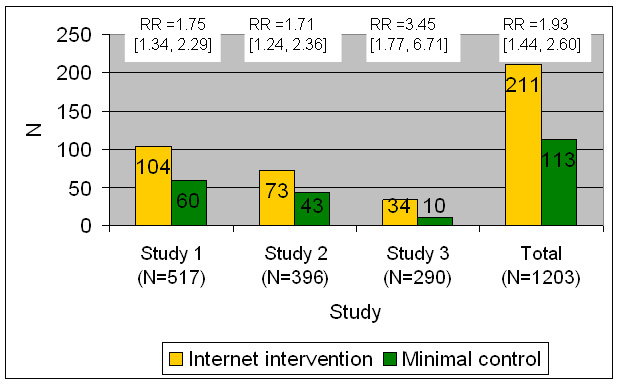ASHES, Vol. 6(2) – Casting a world wide web: A meta-analysis of interactive internet interventions for smoking cessation
Online interventions have potential to help people suffering with addiction. The Internet can reach large, dispersed, and reluctant populations in ways that are impossible for face-to-face interventions. It is possible that interactive features, such as providing immediate personalized feedback, will enhance the effectiveness of online interventions. In this week’s ASHES, we review a meta-analysis of the published literature that compared interactive smoking cessation interventions to minimal, non-interactive, untailored interventions or waitlist controls (Shahab & McEwen, 2009).
Methods
- During December 2008, researchers conducted a systematic search of multiple online databases (e.g., PubMed, PsychINFO, CINHAL Plus) for relevant studies of online support for smoking cessation.
- Researchers included studies meeting the following criteria: published after 1990; participants were current smokers; compared an interactive Internet (i.e., provide personalized information and responses) condition to a minimal, non-interactive, untailored control condition (e.g., booklet or e-mail); at least 1-month follow-up assessing smoking cessation; and randomized control trial design.
- The search strategy yielded 82 studies, but only nine met inclusion criteria; further bibliography searches from the nine selected studies revealed two more eligible papers for a total of 11 studies.
- Researchers analyzed the reviews using Review Manager (i.e., RevMan: a computer program for meta-analyses) and reported rate ratios (i.e., RR) for smoking cessation at follow-up.
- Three of the 11 studies included information from a 6-month follow-up interview. We are reporting only about these three studies because a more
limited follow-up period might be too brief an interval for evaluating long-term outcomes like smoking cessation.
Results
- The three meta-analytic studies included 1,203 participants. Researchers conducted one of the three studies in the U.S. and recruited from the general population for the other two studies.
- The researchers reported that, compared to the controls, 6-month abstinence rates were 17% (95% CI: 12%-21%) higher for the interactive interventions.
- As the Total in Figure 1 shows, compared to controls, the rate of 6-month abstinence for participants in the interactive intervention was nearly double (RR = 1.93; 95% CI: 1.44, 2.60).

Figure. Comparison of Interactive Internet smoking cessation interventions to minimal, non-interactive, untailored control condition – 6-month Abstinence. Click image to enlarge.
Note. Study 1: An et al., 2008 ; Study 2: Brendryen & Kraft, 2008; Study 3: Brendryen et al., 2008. Minimal control, booklet or static website containing information about smoking cessation. RR: Rate Ratio [ ]: 95% Confidence Interval.
Limitations
- The analysis relies on only three studies.
- The three studies did not include many measures of potential confounders (e.g., type of Internet access, socioeconomic status).
Conclusion
This meta-analysis suggests that incorporating interactive Internet interventions in a quit-smoking-plan improves the chances of abstinence at six months by 1.9 times compared to minimal, non-interactive, untailored interventions. The 6-month abstinence rates among the intervention (35%) and control (19%) groups are sizable compared to the ~5% abstinence rate reported by Hughes, Keely, and Naud (2004) among participants attempting to quit without the help of any aids. However, researchers did not measure all possible confounding variables that might affect the results and the available evidence is scant. People who are considering quitting smoking, want to help themselves, and have Internet access, should consider searching the Internet for reputable interventions1.
-John H Kleschinsky
References
Hughes,J. R., Keely, J., & Naud, S. (2004). Shape of the relapse curve and long-term abstinence among untreated smokers. Addiction, 99(1), 29-38.
Shahab,L., & McEwen, A. (2009). Online support for smoking cessation: a systematic review of the literature. Addiction, 104(11), 1792-1804.
What do you think? Please use the comment link below to provide feedback on this article.
________________
1. For more information about how to identify and locate reputable self-directed
interventions for smoking cessation on the Internet, please see ASHES Vol. 3(4)